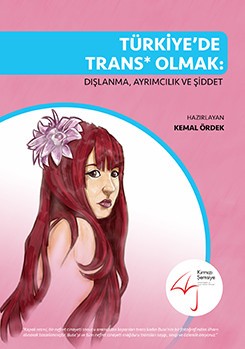Click to read the article in Turkish
“I had a sex-change surgery at a private hospital. Because I have SGK (social security insurance), I wanted to be checked out and get my medication at a public hospital, within my SGK coverage. Then I was confronted with the words of the doctor at the Women and Maternity Ward who said, ‘You’re a man, I don’t approve of your situation. You made a wrong decision, I don’t want to be a part of this mistake of yours.’ The doctor didn’t perform an examination or prescribe me any pills. I was forced to leave the hospital in tears.”
“I’m 45 years old, I did sex work on the streets for years, I still do it. While I’m trying to earn a living, the police detain me and take me to the police station. They give me fines. I can’t pay them of course. I don’t pay them. On the one hand, the government tells me to stay off the streets, to not be a prostitute; on the other hand, they keep on giving me these fines. In order to be able to pay the fines, I need to do even more prostitution work. I have so much debt, not even health services or insurance…”
 Kırmızı Şemsiye (Red Umbrella) Sexual Health and Human Rights Association, under its program, “Trans-Watch: Trans-Directed Rights Violations in Turkey Advocacy Perspectives and Monitoring Project,” has published a book that sheds a light on the rights violations confronted by trans people living in different parts of Turkey over the last year.
Kırmızı Şemsiye (Red Umbrella) Sexual Health and Human Rights Association, under its program, “Trans-Watch: Trans-Directed Rights Violations in Turkey Advocacy Perspectives and Monitoring Project,” has published a book that sheds a light on the rights violations confronted by trans people living in different parts of Turkey over the last year.
Compiled by Kemal Ördek, “Being Trans* in Turkey: Exclusion, Discrimination and Violence” takes the inspiration for its cover photo from the trans woman, Buse, who died as a victim of a hate attack last March in her home in Bakırköy.
The book, which was prepared under the “Trans-Watch” project, which is supported by financial support from the Swedish Istanbul Consulate General and the Open Society Foundation (Açık Toplum Vakfı), includes examples from cases of rights violations recorded in their online database, statistical information, victims’ testimonies, and comments from experts on the status of trans rights in Turkey, activists, NGOs, international organizations, attorneys, and sex workers.
267 rights violations in the last year
According to Kırmızı Şemsiye’s database, in the last year there have been 267 cases of rights violations directed at trans people. In the cases, which took place across 22 provinces in Turkey, serious physical injury, sexual assault, damage to property, discriminatory behavior, psychological violence, hate speech, and other similar types of rights violations against trans people were observed.
Of the 326 total cases in Kırmızı Şemsiye’s online database, 98 (30%) include threats and psychological violence. 18 percent of the same cases occurred to due to serious physical harm. In total, 0.2% (9 cases) were sexual assault, 16% hate speech, and 13% discriminatory behavior.
In the last year a total of seven trans people were murdered. Between January 2008 and June 2016 a total of 43 trans people were murdered. This constitutes the highest statistic among the countries of Europe.
Systematic discrimination and violence
Discrimination and violence targeted at trans people in Turkey constitute a systematic hardship, according to data obtained via the “ProTrans” and “Trans-Watch” projects carried out under the partnership between Kırmızı Şemsiye and “Transgender Europe.”
According to this data, discrimination and violence pushes trans people to look for work in alternative forms of employment, and in this process most of them become involved in the “underground” sector.
Within the trans population, the most at-risk groups are prisoners, children, the youth, the HIV positive, refugees, the elderly, the disabled, immigrants, and the ill. These groups report experiencing higher levels of discrimination and violence.
In a questionnaire of 109 participants, 66 percent expressed constantly experiencing some sort of discrimination, according to the field work carried out by Kırmızı Şemsiye with “Transgender Europe” between 2014-2015.
98 percent of participants reported experiencing discrimination at least once during the hiring period. 68 percent expressed having faced discrimination while trying to access medical services.
87% victims of physical violence, 78% sexual violence
According to fieldwork conducted in 2014 with 233 trans women sex workers in 12 provinces of Turkey, 75 percent of survey participants had fallen victim to very serious physical violence at least once in their life. 86 percent of the offenders in these cases were the sex workers’ customers.
According to the research, 1 in 2 trans women sex workers is physically assaulted by a police officer. 40 percent of the questionnaire participants experienced harsh physical violence from a member of a gang. 54 percent had fallen victim to sexual violence at least once in their life. Victims of psychological violence count as 68 percent.
According to another field work project carried out by Kırmızı Şemsiye and Transgender Europe between 2014-2015, 87 percent of participants said they had fallen victim to physical violence once or twice. 78 percent reported falling victim to sexual violence, and 73 percent to psychological violence or being beaten. 65 percent of participants reported receiving a death threat at least once in their lives.
Police just stand by
According to Kırmızı Şemsiye, hate speech and hate crimes targeted at trans people increase with the police either standing by idly or even encouraging these acts.
According to the field work project carried out by Kırmızı Şemsiye and Transgender Europe between 2014-2015, 71 percent of participants were detained for being trans at least once. Again 71 percent said they had to pay a fine because of being trans. 76 percent reported being consistently harassed by the police.
Trans suicide as a political reality
In Kırmızı Şemsiye’s report, “Violence Directed at Trans Women Sex Workers in Turkey: The Struggle for Existence in the Grip of Invisibility and Impunity,” 57 percent of 233 trans women sex workers interviewed said they drink alcohol every day.
According to the same report, 33 percent of participants reported using drugs frequently. According to Kırmızı Şemsiye, heavy alcohol and drug use together with trans people’s being left vulnerable and in a hopeless situation created a higher propensity for suicide.
50 percent of the trans women sex workers who joined the study said they had thought about committing suicide at least once in their lives. 36 percent said they had found themselves attempting suicide at least once.
Refugee and asylum seeker trans people
According to Kırmızı Şemsiye, among the trans people who live in Turkey, one of the groups whose problems are the least visible and as a result are least likely to receive attention in the struggle for rights are refugee and asylum seeker trans people.
In the book many Syrian trans people have had difficulties with standing out in small and relatively “conservative” satellite cities because their sexual orientation or sexual identity. Without being able to find any trans support groups in these cities, Syrian trans women refugees are forced into doing sex work under bad conditions.
According to the 2009 report, “Insecure Asylum: Security Issues Faced by Lesbian, Gay, Bisexual, Transvestite and Transexual Refugees and Asylum Seekers in Turkey,” published by the Helsinki Citizens Assembly and the Organization for Refuge, Asylum and Migration, those who come to Turkey from other countries experience difficulties with the the local population, as well as other asylum seekers, and the police.
Being trans in prison
Imprisoned trans live in isolating conditions as a result of their sexual identity and sexual expression. Trans prisoners become disconnected with other prisoners. They see their rights to join open-air recreation, workshops, education and work taken away.
Many trans people live in single-person rooms. They can’t shop at the commissary store because they don’t carry the appropriate materials for their gender expression or identity. They recieve bad treatment from prison personnel and even torture.
According to information obtained by Kırmızı Şemsiye, trans people have had the possibility to express their needs during the transition period, procure hormone provisions, or go to the hospital and get reports blocked or delayed by prison administration.
Getting medical treatment or health information
In addition to falling victim to human rights violations in their daily lives, trans people also point to difficulties encountered in their general health conditions, their sexual health, their reproductive health and related information, and in accessing medical services.
Trans people encounter humiliating and degrading attitudes when attempting to get the medical services they want. Being deprived of social security, trans sex workers cannot access health information or services.
Trans people don’t trust the police or the courts
According to Kırmızı Şemsiye’s data, trans people don’t trust the police or the courts. Many trans women sex workers are afraid of future retaliations from their perpetrators, threats, and being revealed as sex workers. For this reason, not many complaints are made against the perpetrators of crimes against trans people, and if they are made, they are generally taken back.
According to interviews conducted with trans women sex workers by Kırmızı Şemsiye in 2014, 42 percent of participants who had fallen victim to violence did not report their cases to the police or prosecution office. They gave their reasons as not trusting justice mechanisms, being afraid of being targeted by the police, and being worried about falling victim again to the same violence.
According to the research in only 11 percent of the cases reported to the police or the prosecution offices did the perpetrator receive the punishment he or she deserved. According to the participants, the other 89 percent of the time the report passed by without the police looking at it, the perpetrator was acquitted, or their sentence was lightened.
Trans peoples’ feeling of learned helplessness as well as the transphobic attitude and behavior of some lawyers have also played a role in the normalization and rise of violence and discrimination.
Transphobic language, anger, and hate intensifies
In Turkey, transphobic media language and anti-trans hate speech becoming widespread has intensified the hate and anger against trans people. In news reports about trans people, topics like sexually transmitted diseases, public safety, public decency, and prostitution’s relation to trans people topics target trans people as a social group and increase these bad conditions.
To download the PDF version of “Being Trans* in Turkey: Exclusion, Discrimination and Violence” click here.
Since 2013, The Kırmızı Şemsiye (Red Umbrella) Sexual Health and Human Rights Association has been systematically monitoring, compiling reports and collecting documents every year about trans peoples’ rights violations, and cases of trans discrimination and violence.
In the process of collecting data, the association draws from house visits, following social media, telephone reports. (SG/ÇT/KT)





.jpg)